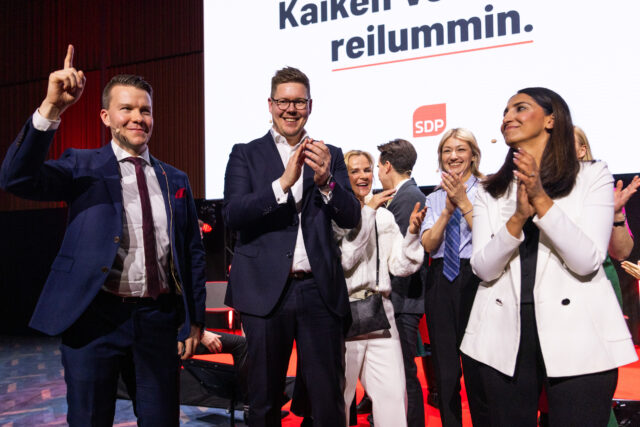
Policies
The world can be changed. All it takes is people with courage. SDP wants to build a just society where everyone has the right to participate, where help and support are always available when needed, and where every child and young person can become anything.
Investing in education and employment, defending fair play in employment, and ensuring effective everyday services are our ways of making sure that things are better tomorrow than they are today. We want to reduce inequality, support those who are most vulnerable, and ensure a habitable planet also for future generations.
In stead of problems, we seek solutions and offer feasible alternatives that generate faith in the future and a just society.
Finnish system
-
Finland is a ‘semi-presidential’ political system, meaning it has both a Prime Minister and a President. The president is leading the foreign and security policy of Finland together with the government. General elections are held for parliament every 4 year which is then electing the prime minister and general election term is 6 years for the President. Finland also has elections for Local Councils County Councils in every four years. The wellbeing services counties are responsible for organising health, social and rescue services as of 1 January 2023. The wellbeing services counties are autonomous, and the highest decision-making power in each county is exercised by a county council.
The European parliament elections are held in Finland at same moment as in the other EU member nations in every 5 year and the European Parliament.
In these three elections it is possible for foreign citizens to vote, provided they are permanent residents of the area (local elections and county elections) or EU citizens (EU elections).
-
The Prime Minister is the head of the Government of Finland. The Prime Minister typically comes from the largest party based on seats in the Parliament (Eduskunta). The political system in Finland typically results in two or more parties having to cooperate to form a coalition Government. Today we have a coalition government with five parties: The Social Democratic party SDP (Prime Minister Sanna Marin) as the leader, The Center party, the Greens, The Left-Wing Alliance, the Swedish People´s Party (SFP).
The National Coalition Party (Kokoomus), and the True Finns and the Christian Democrats (Kristillisdemokraatit) are in opposition.
-
The President is elected directly for a six-year term. Political parties traditionally nominate a candidate, but the President conducts the position on behalf of all of Finland, and not party interests. The President serves as head of state, representing Finland in important national and international ceremonies and events. The main duties of the President with very few exceptions are limited only in the field of foreign policy and security policy of Finland by the constitution and the President has also the duty of the Commander-in-Chief in armed forces.
-
The Constitution is the highest source of law in Finland, defining the systems of Government, and the basic rights of Finnish citizens. The current Constitution came into force on 1 March 2000. Translations can be found at the Ministry of Justice website.
-
Finland is separated into 309 municipal areas, each of which are governed by local Councils. Municipalities are responsible for some local services and receive funds from the Government and via local taxation. The previous council elections have been held in 2020. The County Councils are responsible in organizing the wellbeing services in 21 countries. The capital of Finland Helsinki is organizing the services by the administration of the City council also in the future and the counties will organise the health, social and rescue services from the beginning of 1 January 2023. The wellbeing services counties are autonomous, and the highest decision-making power in each county is exercised by a county council with the financing received from the state.


